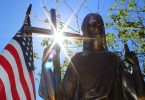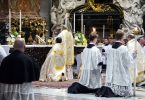
by Kate Scanlon, OSV News
(OSV News) — The Oklahoma Supreme Court heard oral arguments April 2 in a case concerning what would be the first taxpayer-funded Catholic charter school if it survives the legal challenge.
The case raises questions about the constitutionality of taxpayer funding for religious education.
A state school board in Oklahoma voted in June to approve an application by the Archdiocese of Oklahoma City to establish the St. Isidore of Seville Catholic Virtual School, which would be an online public charter school open to students throughout the state from kindergarten through high school. But the state’s Republican governor and attorney general clashed over the decision, with the attorney general calling the school board’s actions “unconstitutional.”
Oklahoma Attorney General Gentner Drummond argued before the state’s highest court that the Statewide Virtual Charter School Board acted unconstitutionally in approving the school.
During the April 2 hearing, Drummond said of the school board, “I think that they betrayed their oath of office, and they knew they betrayed their oath of office because I told them if they did that they would.”
Notre Dame Law School Religious Liberty Clinic represented St. Isidore at the hearing.
“St. Isidore’s mission to reach underserved families, rural communities, and children with special educational needs will strengthen learning opportunities for all,” John Meiser, director of Notre Dame Law School’s Religious Liberty Clinic, said in a statement. “Oklahoma has created a program to support a diverse array of private educators who create innovative educational options like these. The Constitution is clear that the government may not exclude educators from this program — or deprive families the opportunity to attend a school like St. Isidore — solely because they are religious.”
Charter schools are publicly funded but independently run, while being subject to many of the same policies as traditional public schools. Opponents of the effort argue the Oklahoma Constitution bars public funds for sectarian purposes, while supporters argue parents have to opt-in to charter schools, unlike public schools, likening their effort to school choice vouchers, which the U.S. Supreme Court has previously upheld.
In an April 1 statement previewing his argument, Drummond said that if the state is compelled to fund one type of religious education, it may be forced to fund others.
“That is the direction we are heading, and it is wrong on every level,” Drummond said. “I for one do not want my tax dollars funding the teaching of radical Sharia law or the blasphemous tenets of the Church of Satan.”
Addressing criticism on his position from Gov. Kevin Stitt, a fellow Republican, Drummond said, “The Governor of course is free to support the establishment and funding of a Muslim charter school if he wants, but as a committed Christian, I take deep offense to that position. I am doing everything in my power to protect our tax dollars and preserve our religious liberty.”
But some Catholic groups argued St. Isidore should not be excluded as a charter school for being religious, and that its approval would expand education options for families in rural or underserved parts of the state.
Michael McGinley of Dechert LLP, who argued the case on behalf of the charter school, said in a statement, “I am proud to work together with Notre Dame’s Religious Liberty Clinic to support St. Isidore’s mission to bring new educational resources to families across Oklahoma, regardless of their income or background.”
“We are hopeful that the Court will uphold St. Isidore’s fundamental right to serve its community through important programs like Oklahoma’s charter-school system,” he said.






